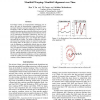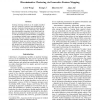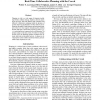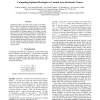112
Voted
AAAI
2012
13 years 3 months ago
2012
Knowledge transfer is computationally challenging, due in part to the curse of dimensionality, compounded by source and target domains expressed using different features (e.g., do...
129
click to vote
AAAI
2012
13 years 3 months ago
2012
Novel tractable classes of the binary CSP (constraint satisfaction problem) have recently been discovered by studying classes of instances defined by excluding subproblems descri...
141
Voted
AAAI
2012
13 years 3 months ago
2012
This paper concerns learning and prediction with probabilistic models where the domain sizes of latent variables have no a priori upper-bound. Current approaches represent prior d...
109
Voted
AAAI
2012
13 years 3 months ago
2012
Many noise models do not faithfully reflect the noise processes introduced during data collection in many real-world applications. In particular, we argue that a type of noise re...
121
Voted
AAAI
2012
13 years 3 months ago
2012
In cooperative games, a key question is to find a division of payoffs to coalition members in a fair manner. Nucleolus is one of such solution concepts that provides a stable sol...
102
Voted
AAAI
2012
13 years 3 months ago
2012
Existing clustering methods can be roughly classified into two categories: generative and discriminative approaches. Generative clustering aims to explain the data and thus is ad...
124
click to vote
AAAI
2012
13 years 3 months ago
2012
Planning is vital to a wide range of domains, including robotics, military strategy, logistics, itinerary generation and more, that both humans and computers find difficult. Col...
136
Voted
AAAI
2012
13 years 3 months ago
2012
In conservation biology and natural resource management, adaptive management is an iterative process of improving management by reducing uncertainty via monitoring. Adaptive manag...
135
Voted
AAAI
2012
13 years 3 months ago
2012
Significant progress has been made recently in the following two lines of research in the intersection of AI and game theory: (1) the computation of optimal strategies to commit ...
99
Voted
AAAI
2012
13 years 3 months ago
2012
We consider the problem of selecting fair divisions of a heterogeneous divisible good among a set of agents. Recent work (Cohler et al., AAAI 2011) focused on designing algorithms...




